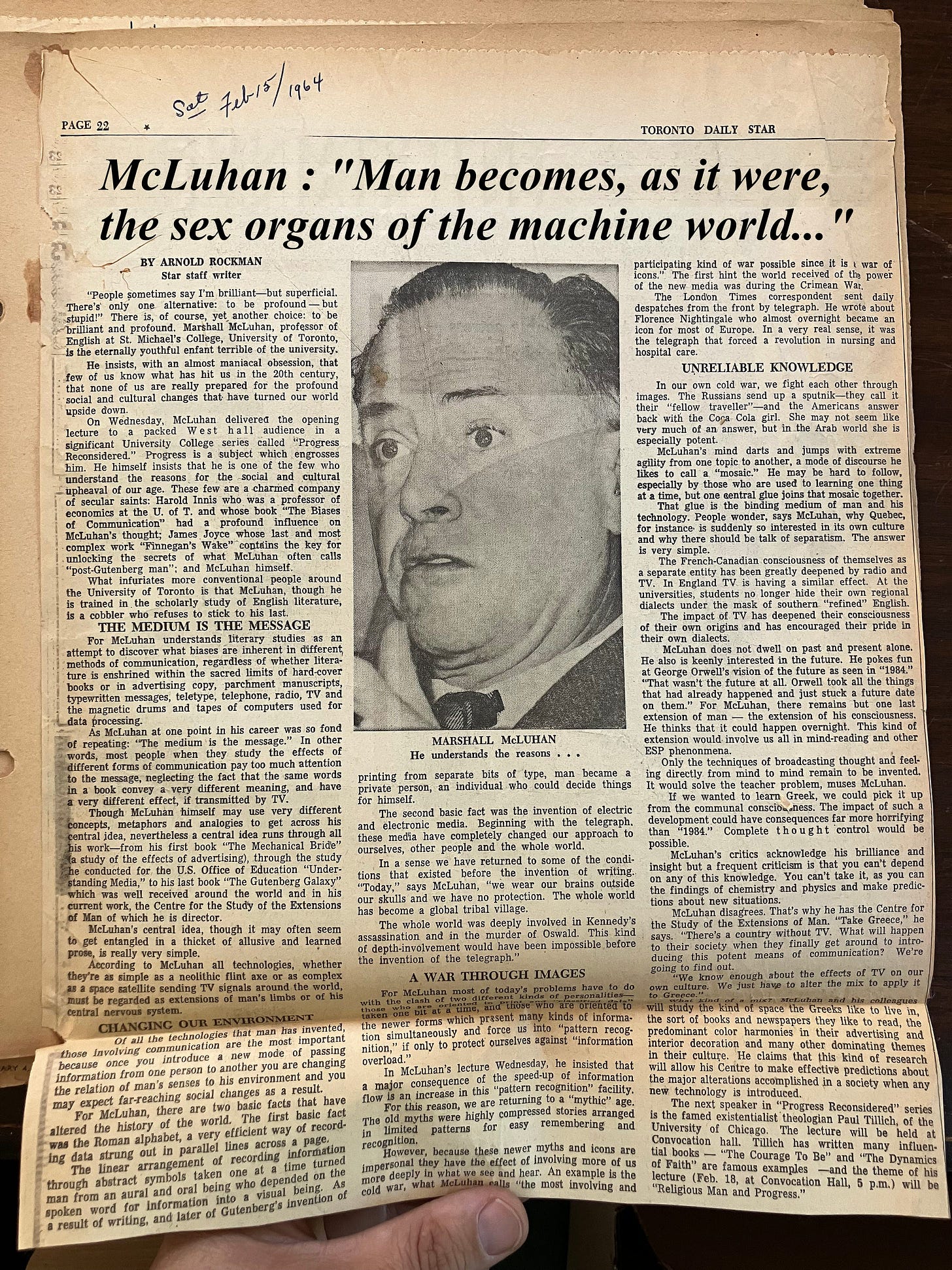Marshall McLuhan’s essay “Notes on Burroughs,” published in The Nation on December 28, 1964, is a provocative exploration of William S. Burroughs’ novels Naked Lunch (1959) and Nova Express (1964), interpreting them as a lens for understanding media, technology, and their impact on human perception and society. McLuhan uses his signature aphoristic, probing style to draw bold connections between Burroughs’ experimental prose and his own media theories, often with deliberately outrageous or cryptic statements meant to jolt readers into new perspectives. Below is a list of the top ten statements from the essay, selected for their audacity, intellectual depth, and alignment with McLuhan’s tendency to make “outrageous” probes, with an emphasis on their similarity to the Finnegans Wake quote’s bold redefinition of cultural artifacts. Each is quoted directly, with context and analysis to highlight its significance and provocative nature, sourced from the essay as found in archived references.
“Today men’s nerves surround us; they have gone outside as electrical environment.”
Why It’s Provocative: This opening line is a startling metaphor, suggesting that human nervous systems have been externalized into a pervasive electrical network, a sci-fi-like image that reimagines media as an extension of biology. It’s as bold as claiming Finnegans Wake is a media guidebook, reframing technology as an organic force.
Context: McLuhan introduces Burroughs’ vision of a world where media technologies (radio, TV, etc.) act as extensions of the human nervous system, creating an inescapable environment that reprograms perception, setting the stage for the essay’s exploration of Burroughs’ dystopian media landscape.
“The human nervous system itself can be reprogrammed biologically as readily as any radio network can alter its fare.”
Why It’s Provocative: Equating the human nervous system to a radio network suggests a radical malleability of human consciousness, implying technology can rewire us as easily as tweaking a broadcast. It’s an outrageous leap that echoes the Wake quote’s audacious claims about literature’s power.
Context: McLuhan sees Burroughs’ Naked Lunch as depicting private strategies for navigating this reprogramming, where media technologies manipulate human biology and psyche in the electric age.
“Each technological extension involves an act of collective cannibalism.”
Why It’s Provocative: The visceral imagery of “cannibalism” to describe technology’s impact is shocking, suggesting that new media consume and digest older environments and their values. It’s a dramatic, almost grotesque probe, akin to elevating Finnegans Wake to a universal media blueprint.
Context: McLuhan argues that new media environments (e.g., electronic media) swallow and reprocess the values of prior environments (e.g., nature or print culture), a process Burroughs’ work vividly illustrates through its chaotic, fragmented narratives.
“The logic, physical and emotional, of a world in which we have made our environment out of our own nervous systems, Burroughs follows everywhere to the peripheral orgasm of the cosmos.”
Why It’s Provocative: This cosmic, almost psychedelic phrasing ties media environments to a universal, orgasmic climax, a wildly exaggerated metaphor that feels as grandiose as the Wake claim. It’s McLuhan at his most poetic and outlandish.
Context: McLuhan interprets Burroughs’ prose as tracing the all-encompassing effects of media, which extend human senses to a universal scale, creating a sensory and emotional overload that Burroughs’ fragmented style mirrors.
“It is the medium that is the message because the medium creates an environment that is as indelible as it is lethal.”
Why It’s Provocative: This reiteration of McLuhan’s famous aphorism is intensified by calling media environments “lethal,” a dire warning that echoes Burroughs’ dystopian tone. Its starkness aligns with the Wake quote’s bold redefinition of a cultural artifact’s power.
Context: McLuhan uses Burroughs’ work to underscore how media, not content, shape society’s psyche, creating environments that are both inescapable and potentially destructive, urging awareness to mitigate their effects.
“Burroughs is unique only in that he is attempting to reproduce in prose what we accommodate every day as a commonplace aspect of life in the electric age.”
Why It’s Provocative: Claiming Burroughs’ avant-garde, disjointed prose merely reflects everyday media experiences is a provocative downplaying of his radical style, akin to framing Finnegans Wake as a practical guide. It’s a sly, counterintuitive probe.
Context: McLuhan argues that Burroughs’ cut-up method mirrors the fragmented, nonlinear nature of modern media like television or newspapers, which bombard us with disjointed impressions, making his work a direct reflection of the electric age’s sensory chaos.
“There is no privacy and no private parts. In a world in which we are all ingesting and digesting one another there can be no obscenity or pornography or decency.”
Why It’s Provocative: This shocking statement erases boundaries between individuals, suggesting a grotesque, total interconnectedness where moral categories dissolve. Its visceral tone matches the Wake quote’s audacity in redefining cultural norms.
Context: McLuhan describes Burroughs’ vision of electric media as creating a “global membrane” where privacy vanishes, and human interactions become a collective, almost biological process, as depicted in Nova Express.
“Burroughs is not asking merit marks as a writer; he is trying to point to the shut-on button of an active and lethal environmental process.”
Why It’s Provocative: Framing Burroughs as an alarmist rather than a literary figure, pointing to a “shut-on button,” is a dramatic, almost apocalyptic call to action. It’s as bold as claiming Finnegans Wake controls media understanding, prioritizing impact over artistry.
Context: McLuhan sees Burroughs’ work as a warning about uncontrolled media proliferation, urging readers to recognize and resist the lethal effects of technological environments, not to judge his literary merit.
“Finnegans Wake provides the closest literary precedent to Burroughs’ work.”
Why It’s Provocative: This direct comparison of Burroughs’ experimental novels to Joyce’s Finnegans Wake is a bold claim, echoing your provided quote. It’s outrageous for suggesting a famously impenetrable novel is a direct precursor to Burroughs’ chaotic prose, elevating both to media theory touchstones.
Context: McLuhan argues that Joyce’s Finnegans Wake, with its focus on human extensions (language, media, technology), anticipates Burroughs’ exploration of media’s sensory and cultural impacts, both using nonlinear forms to probe technological effects.
“Like Burroughs, Joyce was sure he had worked out the formula for total cultural understanding and control.”
Why It’s Provocative: Attributing to Joyce (and Burroughs) a grandiose ambition to master “total cultural understanding” is a hyperbolic claim, akin to the Wake quote’s elevation of a text to a universal guide. It’s audacious for implying such control is possible through literature.
Context: McLuhan sees both Joyce and Burroughs as artists who map the effects of media and technology on culture, with Finnegans Wake and Nova Express serving as formulas for decoding and potentially controlling these transformations.













Share this post